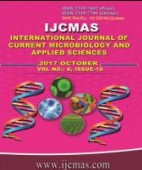


 National Academy of Agricultural Sciences (NAAS)
National Academy of Agricultural Sciences (NAAS)

|
PRINT ISSN : 2319-7692
Online ISSN : 2319-7706 Issues : 12 per year Publisher : Excellent Publishers Email : editorijcmas@gmail.com / submit@ijcmas.com Editor-in-chief: Dr.M.Prakash Index Copernicus ICV 2018: 95.39 NAAS RATING 2020: 5.38 |
Very often, genetics of quantitative traits is unraveled using first (mean) and/or second degree statistics (variance) and their derivatives. Genetic analysis based on skewness, the third degree statistics and kurtosis, the fourth degree statistics is more powerful and useful than first and second degree statistics, especially for detecting and characterizing the nature of epistasis. An investigation was carried out to unravel and interpret genetics of fresh pod yield and its component traits using skewness and kurtosis estimated in F2and F3 populations derived from two crosses of dolichos bean, one of the important food grain legume extensively grown in India. The positively skewed platykurtic distribution of F2 and F3 populations derived from the two crosses indicated the role of large number of increasing effects genes with majority of them displaying complementary epistasis in the expression of most of the traits. The expected gain is slow with mild selection while it is rapid with intense selection for the improvement of the traits investigated. The study provided comprehensive and mutually complementary information on the mode of action of gene controlling fresh pod yield and its component traits based on third and fourth degree statistics.
 |
 |
 |
 |
 |